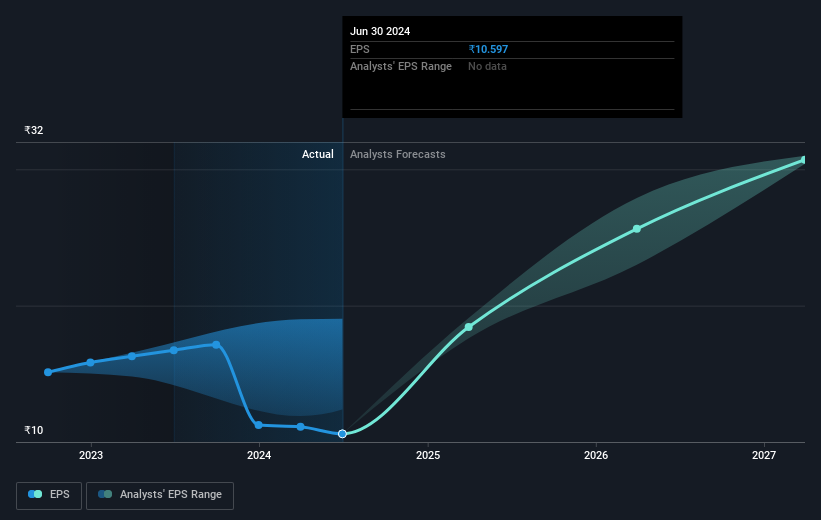Sonata Software's (NSE:SONATSOFTW) earnings growth rate lags the 44% CAGR delivered to shareholders

We think all investors should try to buy and hold high quality multi-year winners. And highest quality companies can see their share prices grow by huge amounts. Don't believe it? Then look at the Sonata Software Limited (NSE:SONATSOFTW) share price. It's 430% higher than it was five years ago. And this is just one example of the epic gains achieved by some long term investors. On the other hand, we note it's down 9.9% in about a month. We note that the broader market is down 0.6% in the last month, and this may have impacted Sonata Software's share price.
While this past week has detracted from the company's five-year return, let's look at the recent trends of the underlying business and see if the gains have been in alignment.
Check out our latest analysis for Sonata Software
While the efficient markets hypothesis continues to be taught by some, it has been proven that markets are over-reactive dynamic systems, and investors are not always rational. One flawed but reasonable way to assess how sentiment around a company has changed is to compare the earnings per share (EPS) with the share price.
Over half a decade, Sonata Software managed to grow its earnings per share at 2.6% a year. This EPS growth is slower than the share price growth of 40% per year, over the same period. This suggests that market participants hold the company in higher regard, these days. That's not necessarily surprising considering the five-year track record of earnings growth. This optimism is visible in its fairly high P/E ratio of 56.87.
The company's earnings per share (over time) is depicted in the image below (click to see the exact numbers).

Dive deeper into Sonata Software's key metrics by checking this interactive graph of Sonata Software's earnings, revenue and cash flow.
What About Dividends?
When looking at investment returns, it is important to consider the difference between total shareholder return (TSR) and share price return. The TSR is a return calculation that accounts for the value of cash dividends (assuming that any dividend received was reinvested) and the calculated value of any discounted capital raisings and spin-offs. Arguably, the TSR gives a more comprehensive picture of the return generated by a stock. We note that for Sonata Software the TSR over the last 5 years was 516%, which is better than the share price return mentioned above. This is largely a result of its dividend payments!
A Different Perspective
Sonata Software shareholders gained a total return of 17% during the year. But that was short of the market average. On the bright side, the longer term returns (running at about 44% a year, over half a decade) look better. It may well be that this is a business worth popping on the watching, given the continuing positive reception, over time, from the market. While it is well worth considering the different impacts that market conditions can have on the share price, there are other factors that are even more important. Consider for instance, the ever-present spectre of investment risk. We've identified 4 warning signs with Sonata Software , and understanding them should be part of your investment process.
For those who like to find winning investments this free list of undervalued companies with recent insider purchasing, could be just the ticket.
Please note, the market returns quoted in this article reflect the market weighted average returns of stocks that currently trade on Indian exchanges.
New: Manage All Your Stock Portfolios in One Place
We've created the ultimate portfolio companion for stock investors, and it's free.
• Connect an unlimited number of Portfolios and see your total in one currency
• Be alerted to new Warning Signs or Risks via email or mobile
• Track the Fair Value of your stocks
Have feedback on this article? Concerned about the content? Get in touch with us directly. Alternatively, email editorial-team (at) simplywallst.com.
This article by Simply Wall St is general in nature. We provide commentary based on historical data and analyst forecasts only using an unbiased methodology and our articles are not intended to be financial advice. It does not constitute a recommendation to buy or sell any stock, and does not take account of your objectives, or your financial situation. We aim to bring you long-term focused analysis driven by fundamental data. Note that our analysis may not factor in the latest price-sensitive company announcements or qualitative material. Simply Wall St has no position in any stocks mentioned.
About NSEI:SONATSOFTW
Sonata Software
Provides information technology services and solutions in the United States, Europe, the Middle East, Asia, India, and Australia.
High growth potential established dividend payer.


